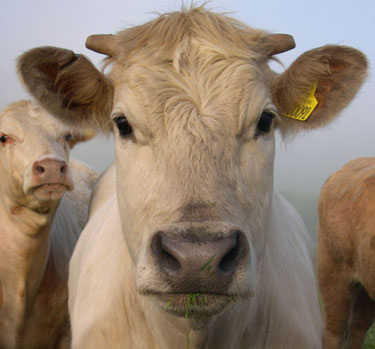 I was turned on to vegetarianism in college at my co-ed, co-operative living situation. There were 30 of us living at the “Peace House” and we took turns cooking communal meals each night, all veg. I liked the idea of communal living and with tensions brewing in Iraq (it was 1990) the thought of a group of students aligned around creating more love in the world was very appealing.
I was turned on to vegetarianism in college at my co-ed, co-operative living situation. There were 30 of us living at the “Peace House” and we took turns cooking communal meals each night, all veg. I liked the idea of communal living and with tensions brewing in Iraq (it was 1990) the thought of a group of students aligned around creating more love in the world was very appealing.
I grew up eating meat (chicken, beef, bacon, fish) just about every day of the week and was super attached to it! The idea of a vegetarian diet was more romanticized than an easy switch. I found myself eating big, whole foods dinners at the co-op and while I no longer felt hungry, I still craved roasted flesh. I was programmed (like so many of us) to believe that a meal was not complete, couldn’t be satisfying, without some type of animal protein. It was more than a little embarrassing but I sometimes found myself drive to Burger King after house meals to grab a cheeseburger. Yet, the “seed” was planted and I was already more open to non-carnivorous alternatives.
However, I still resisted the “full monty” until I went to the Middle East for a year after college. I was walking down a cobblestone street in the Old City of Jerusalem when a religious man in white stopped me and gently touched my arm. He peered deep into my eyes with his bright, blue Paul Newman’s and slowly shook his head with great concern.
“Brother, you’ve got to stop the dairy. You’re killing yourself!” And here I had figured my big problem was simply cutting out meat. Thus was my introduction into self-directed Macrobiotics. I started to run with the dangerous crowd of macrobiotic, Orthodox Jews. Who knew there was an even tinier sub-group of the sub-group?!? I found there were hundreds of observant folks in Jerusalem who took their religious adherence to include a healthy, sustainable diet that is in sync with the rhythms of nature.
That year I learned a great deal about how my relationship to food is deeply connected to my emotional life, my socio-political world and even the metaphysical. When I returned to the States, I brought with me a new sense of my connection to food and an affinity for Tamari roasted pumpkin seeds.
Lots of friends and family did not (and many still don’t) understand the point of removing animal products from my diet. There were times when I argued and fought about it, provided supporting materials and links, and yet in the end, I find the most peaceful approach is simply smiling.
One of the things I have learned in my life is that whenever I feel the need to convince someone else about something, I am already on shaky ground within my own being. Whether it is politics, social justice, faith or even food, if I need to convince you that I’m right, I’m wrong. If someone is interested in what I feel or what I believe, they can ask for more information.
So, I smile at the comments, breathe deeply and continue to enjoy my seitan. As the savvy vegetarian suggests, I’m counting on the hundredth monkey effect in the hope that more and more people will just consider removing meat from their diet one day a week!
Macrobiotic actually means “big life” and it seemed consistent with my intention for the type of existence I wanted. Since my time in Jerusalem, now more than two decades, I have delved deeply both into Macrobiotic living as well as the McDonald’s Life. I have been lean and fit for some time, as well as soft and obese. Periodically, I am able to maintain a macrobiotic diet for one or two years, amassing an array of jars filled with seeds, seaweed, dried shitakes, and grains. In fact, I have never felt more alive, more energetic and more healthy than those periods on a primarily macrobiotic diet and lifestyle. I love the rigidty of it! I love knowing that there is a very limited array of foods I can eat. Like Temple Grandin and her cattle chute, I feel contained by it…
The problem has been that it can be so restrictive and extreme that I find myself eventually resenting it and craving chocolate cake, pizza ( I mean, a whole pizza) or even barbecued chicken. Yet, as it is once again a new year, I broke out the brown rice and seaweed in the hope that this is my year. Back to basics. Right?
A great resource for the macrobiotic lifestyle is anything by Michio Kushi and Jessica Porter’s Hip Chick’s Guide to Macrobiotics.
 Being a vegetarian isn’t considered as far “out there” as it used to be: according to a 2008 study from Vegetarian Times, 3.2 percent of Americans are vegetarian, .5 percent are vegan, and 10 percent say they follow a largely vegetarian-inclined diet. Whether you are interested in eating less meat and animal products (or cutting them out altogether) for ethical, health or environmental reasons, here are the basics of vegetarianism:
Being a vegetarian isn’t considered as far “out there” as it used to be: according to a 2008 study from Vegetarian Times, 3.2 percent of Americans are vegetarian, .5 percent are vegan, and 10 percent say they follow a largely vegetarian-inclined diet. Whether you are interested in eating less meat and animal products (or cutting them out altogether) for ethical, health or environmental reasons, here are the basics of vegetarianism:
1. Vegetarian: This term basically describes a person who does not eat poultry, meat, seafood or fish.
2. Pescatarian/ Semi-Vegetarian: A person who eats dairy products, poultry (including eggs) and fish, but does not eat any other animal flesh or products.
3. Ovo-Lacto-Vegetarian: Someone who eats eggs and milk, but doesn’t eat any other animal products.
4. Ovo-Vegetarian: A person who eats eggs but no other animal products or flesh.
5. Lacto-Vegetarian: Someone who eats milk but no other animal products or flesh.
6. Vegan: Vegans do not knowingly eat or wear any animal flesh, products or by-products. Some vegans also don’t consume yeast or honey, and often opt not to wear clothing and accessories made from animals, although a recent piece I stumbled on suggests (rightfully) that it isn’t really feasible to be a vegan anymore in this day and age…I have been vegan for several years of my life and it is in many ways more challenging for me than being macrobiotic. Vegans don’t have an easy time eating out and I LOVE eating out.
If you are considering a change in your diet that excludes or limits animal products, be sure to take appropriate supplements that can supply essential vitamins, minerals and fats that are typically provided by animal-based sources.
Want to Eat Less Meat? I’m sure you’ve all seen the photos that Manhattan artist Sally Davies captured of the same McDonald’s Happy Meal photographed each day for 6 months without any visible change.
Whether you want to minimize your consumption of animal products or eliminate it altogether, there are hundreds of alternatives to fast food and even over-produced, genetically modified slow food. In their place? Completely satisfying alternatives, from beans and legumes to whole foods.
I’d be a big (fat) liar if I said that I eat a perfectly healthy diet every day and that I haven’t enjoyed any meat from time to time. In fact, it has been a tremendous challenge for me in the past two decades as I have learned so much about the food I eat and still make unhealthy decisions sometimes. I have to be one of the most well-informed overweight people in the world. However, the dialogue is in place and I tend not to stray for too long if I find myself on a bender.
For now, even choosing healthier alternatives a couple days a week not only makes me feel better, it is better for the planet.


 Jeffrey Sumber is changing the world, one relationship at a time. For over two decades, Jeffrey has worked to understand the human experience from as many angles as possible. As a successful psychotherapist, marriage counselor, and life coach, Jeffrey has worked with thousands of clients who strive to live their best lives.
Jeffrey Sumber is changing the world, one relationship at a time. For over two decades, Jeffrey has worked to understand the human experience from as many angles as possible. As a successful psychotherapist, marriage counselor, and life coach, Jeffrey has worked with thousands of clients who strive to live their best lives.